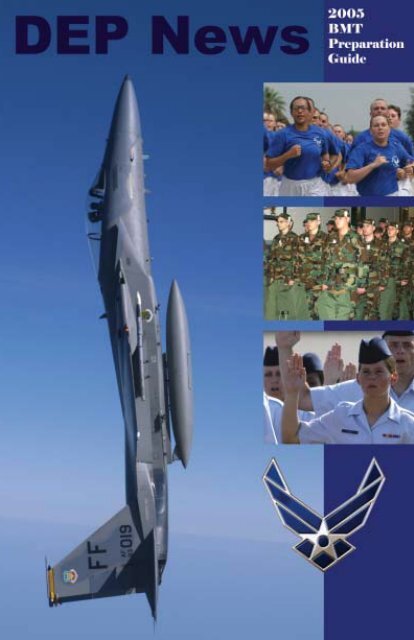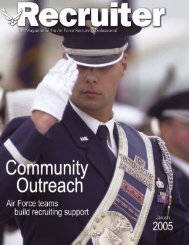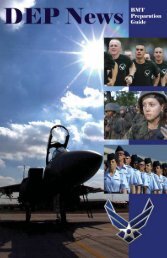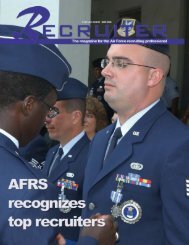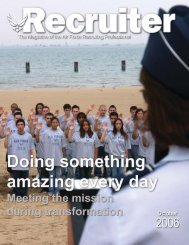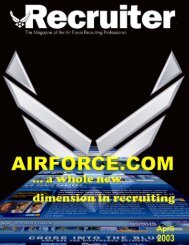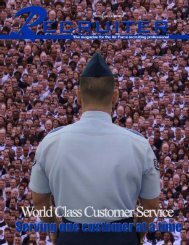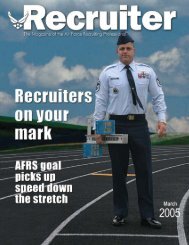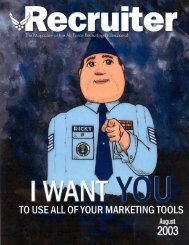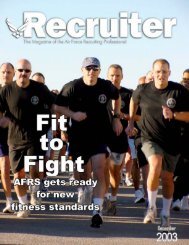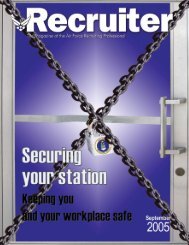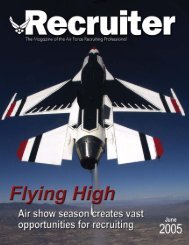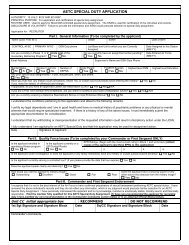DEP News September 2003 - Air Force Recruiting Service
DEP News September 2003 - Air Force Recruiting Service
DEP News September 2003 - Air Force Recruiting Service
You also want an ePaper? Increase the reach of your titles
YUMPU automatically turns print PDFs into web optimized ePapers that Google loves.
BMT Preparation Guide<br />
1
You qualified mentally,<br />
morally and physically for<br />
the branch of service<br />
requiring the highest of<br />
these standards —<br />
America’s <strong>Air</strong> <strong>Force</strong>. Many<br />
don’t make it through this<br />
process for one reason or<br />
another and never have<br />
the opportunities now<br />
awaiting you.<br />
You are officially a member of<br />
the <strong>Air</strong> <strong>Force</strong> Delayed Entry<br />
Program. As a member of the<br />
<strong>DEP</strong>, your delay in joining the<br />
active-duty ranks can be as short<br />
as two weeks, but no longer than<br />
one year.<br />
You made the commitment and<br />
took the oath. You are now a<br />
member of the <strong>Air</strong> <strong>Force</strong> inactive<br />
Reserve. More importantly, you’re<br />
a member of the <strong>Air</strong> <strong>Force</strong> family<br />
— one in which we look out for<br />
each other and take steps to ensure<br />
the well-being of the entire team.<br />
Having someone there to look<br />
out for you is much like having an<br />
<strong>Air</strong> <strong>Force</strong> wingman whose position<br />
is critical to mission success.<br />
Everyone in the <strong>Air</strong> <strong>Force</strong> plays<br />
an important role in the wingman<br />
2<br />
concept. Each is in a position to<br />
observe if their co-workers or<br />
fellow squadron members are<br />
experiencing stress due to work or<br />
matters away from the job that<br />
may impact the mission.<br />
You, too, serve as wingmen to<br />
the others in the <strong>DEP</strong>. Getting to<br />
know those who are entering<br />
active duty at the same time as you<br />
helps ease your transition and<br />
better prepares you for Basic<br />
Military Training.<br />
A decision to join any branch of<br />
the armed forces is a big step and<br />
often involves the stress of leaving<br />
family and friends. It may also lead<br />
to anxiety over waiting to leave for<br />
BMT. If you sense this in other<br />
members of the <strong>DEP</strong>, talk about it.<br />
Talk to your recruiter, who’s in the<br />
best position to help. Don’t let your<br />
wingman down.<br />
As a member of the <strong>DEP</strong>, you<br />
and your wingman will attend a<br />
monthly <strong>DEP</strong> commander’s call.<br />
These meetings ensure you receive<br />
information needed to contribute to<br />
your success in BMT and technical<br />
school. It also provides the chance<br />
to ask questions about the <strong>Air</strong><br />
<strong>Force</strong> and verify qualifications.<br />
Again, congratulations on<br />
becoming the newest member of<br />
America’s <strong>Air</strong> <strong>Force</strong>.<br />
BMT Preparation Guide
Preparation eases transition<br />
It’s not unusual to feel excited or<br />
anxious about leaving for <strong>Air</strong> <strong>Force</strong><br />
Basic Military Training. After all,<br />
you’ll be separated from family and<br />
friends, which can be stressful.<br />
The key is mental and physical<br />
preparation.<br />
Getting involved with <strong>Air</strong> <strong>Force</strong>related<br />
activities can<br />
be a way to<br />
overcome<br />
apprehensive<br />
feelings.<br />
Spend<br />
time talking<br />
to your local<br />
recruiter.<br />
Ask him or<br />
her about<br />
<strong>Air</strong> <strong>Force</strong><br />
life and what<br />
to expect at<br />
by Master Sgt. David Richards<br />
A training instructor briefs a flight of newly<br />
arrived trainees at Lackland <strong>Air</strong> <strong>Force</strong><br />
Base, Texas.<br />
basic training. Hanging out with<br />
other people who are in the<br />
Delayed Entry Program is another<br />
way to help overcome uneasy<br />
feelings. <strong>DEP</strong> commander’s calls<br />
are an ideal place to talk and<br />
interact with people in the <strong>DEP</strong>.<br />
These meetings are generally<br />
monthly and are mandatory.<br />
Another way to deal with hesitant<br />
feelings is to help your recruiter<br />
with duties. By doing this, you’ll be<br />
performing official duties, giving<br />
you a sense of belonging to your<br />
<strong>Air</strong> <strong>Force</strong> family. Recruiters visit<br />
local high schools and talk to<br />
students. You can help by telling<br />
someone else about your decision<br />
to join the <strong>Air</strong> <strong>Force</strong>.<br />
Part of <strong>Air</strong> <strong>Force</strong> life revolves<br />
around physical fitness. Throughout<br />
your <strong>Air</strong> <strong>Force</strong> career you’ll be<br />
expected to meet certain physicalconditioning<br />
standards.<br />
Physical<br />
readiness<br />
training is<br />
designed to<br />
ensure <strong>Air</strong><br />
<strong>Force</strong><br />
members<br />
are physically<br />
capable<br />
of<br />
handling<br />
military duty,<br />
while<br />
maintaining good personal health<br />
and looking sharp in uniform.<br />
Physical readiness training at<br />
BMT can be rigorous if you’re not<br />
prepared. A physically fit trainee<br />
has a greater chance of avoiding<br />
injury and graduating on time. Start<br />
an exercise program three times a<br />
week for 45 minutes a session.<br />
The program should emphasize<br />
muscular strength, flexibility and<br />
cardiorespiratory endurance.<br />
Muscular strength is defined as the<br />
maximum amount of force a<br />
muscle can produce in a single<br />
BMT Preparation Guide<br />
3
y Master Sgt. David Richards<br />
movement. A training program using<br />
free weights is an ideal method to<br />
attain muscular strength and endurance.<br />
A well-rounded exercise program<br />
also requires stretching before and<br />
after any exercise. Five to seven<br />
minutes of stretching before and<br />
after a workout is a good standard.<br />
Stretching should be performed in a<br />
slow, controlled manner for 10 to 30<br />
seconds with some tension in the<br />
muscle. Avoid bouncing or using<br />
jerky movements because this may<br />
cause injury. Stretching helps<br />
flexibility and prevents common<br />
injuries, such as shin splints.<br />
In addition to strength, endurance<br />
and stretching, you should be<br />
prepared for the cardiorespiratory<br />
endurance challenge at BMT. Build<br />
your endurance through aerobic<br />
exercise of at least 20 minutes three<br />
to five times a week using such<br />
exercises as cycling, swimming,<br />
roller-blading, running and lap<br />
swimming.<br />
Succeeding at BMT is a matter of<br />
mental and physical preparation.<br />
4<br />
BMT Preparation Guide
BMT Preparation Guide<br />
5
Shipping out<br />
Preparation key for smooth<br />
processing to active duty<br />
On your date for departure to<br />
Basic Military Training, you will<br />
report to the Military Entrance<br />
Processing Station for processing<br />
to enter <strong>Air</strong> <strong>Force</strong> active duty.<br />
Your recruiter will give you a<br />
complete briefing on transportation,<br />
lodging and MEPS processing.<br />
Immediately notify your recruiter<br />
of any changes in your status. Do<br />
not wait until the last minute to tell<br />
your recruiter about any changes to<br />
your physical condition, marital<br />
status, law violations, drug use or<br />
educational status. Also inform<br />
your recruiter of any new tattoos<br />
or body piercings.<br />
If you’re not sure whether<br />
something should be made a matter<br />
of record, you should provide the<br />
documents to your recruiter for a<br />
determination. This gives your<br />
recruiter enough time to get the<br />
documentation required to ensure<br />
you remain qualified for the <strong>Air</strong><br />
<strong>Force</strong>. This is very important<br />
because a delay in your active duty<br />
enlistment could result in cancellation<br />
of your guaranteed enlistment<br />
contract agreement.<br />
Upon arrival at the MEPS, you<br />
will undergo a physical exam and<br />
review all personal information you<br />
provided during your initial processing,<br />
your contracts and enlistment<br />
agreements. You also take the oath<br />
of enlistment.<br />
Physical exam<br />
All body piercings must be<br />
removed before arriving at the<br />
MEPS. You will receive a physical<br />
inspection at the MEPS to ensure<br />
you are still physically qualified to<br />
enter active duty. You must inform<br />
the examining medical official of<br />
any injuries or illnesses since your<br />
initial exam.<br />
Your weight is also checked. It<br />
is your responsibility to ensure you<br />
<strong>Air</strong> <strong>Force</strong> <strong>Recruiting</strong> <strong>Service</strong> publishes <strong>DEP</strong> <strong>News</strong> as a monthly insert to New<br />
<strong>Air</strong>man magazine. Information is intended for people in the <strong>Air</strong> <strong>Force</strong>’s<br />
Delayed Entry Program. Information in this publication is subject to change<br />
without notice. All photographs are U.S. <strong>Air</strong> <strong>Force</strong> photos unless otherwise<br />
identified. Questions and comments should be directed to AFRS Public<br />
Affairs at (210) 565-4678 or DSN 665-4678, or e-mailed to<br />
afrshqpa@rs.af.mil.<br />
6<br />
BMT Preparation Guide
meet current <strong>Air</strong> <strong>Force</strong> weight<br />
standards. If you were given an<br />
initial body fat measurement, you<br />
will be given another body fat<br />
measurement on your scheduled<br />
date of active duty enlistment.<br />
If you are over the maximum<br />
allowable weight for your height<br />
and fail your body fat measurement,<br />
you will not be allowed to<br />
enter active duty. Your recruiter<br />
will explain this process to you.<br />
Enlistment contract<br />
Once you successfully complete<br />
the physical exam, the <strong>Air</strong> <strong>Force</strong><br />
liaison NCO conducts a review of<br />
enlistment contract agreements.<br />
Any changes to your status will<br />
be discussed and properly documented<br />
on your application,<br />
contracts and/or enlistment agreements.<br />
You are required to reveal<br />
everything that has occurred since<br />
your initial processing. For example,<br />
any arrests, offenses, fines,<br />
violations or tickets, changes in<br />
marital status, dependents or other<br />
significant information.<br />
If you entered the <strong>DEP</strong> as a<br />
high school senior, your diploma<br />
must be validated prior to entry on<br />
active duty. When the review is<br />
finished, you should be aware of<br />
the exact enlistment options you<br />
are entitled to:<br />
- your enlistment grade<br />
- your term of enlistment<br />
- the exact aptitude area or job<br />
you are guaranteed<br />
Remember, only the guarantees<br />
BMT Preparation Guide<br />
listed on your contract will be<br />
honored by the <strong>Air</strong> <strong>Force</strong>. Your<br />
recruiter and others who participate<br />
in your processing are prohibited<br />
from making any promises or<br />
guarantees of any type that do not<br />
appear on your contract and<br />
agreement.<br />
As in any legal transaction,<br />
neither you nor the <strong>Air</strong> <strong>Force</strong> is<br />
obligated by terms not specifically<br />
contained in writing. It’s your<br />
responsibility to read all documents<br />
before you sign them, and to be<br />
sure you understand what you are<br />
signing.<br />
Once the <strong>Air</strong> <strong>Force</strong> liaison NCO<br />
completes your processing, you’ll<br />
return to the MEPS processing<br />
section for your final preparation<br />
to enter <strong>Air</strong> <strong>Force</strong> active duty.<br />
Documents<br />
You must bring your Social<br />
Security card and driver’s license,<br />
if you possess one, and a copy of<br />
your birth certificate.<br />
If you are married, you’ll need<br />
to bring an original or certified copy<br />
of your marriage certificate and a<br />
copy of your spouse’s Social<br />
Security card and birth certificate.<br />
If you have children, you’ll need to<br />
bring copies of their Social Security<br />
cards and birth certificates.<br />
Those who have earned college<br />
credit should also bring a copy of<br />
their official college transcripts.<br />
Your recruiter can provide more<br />
information on earning a higher<br />
rank based on college credit.<br />
7
Oath of enlistment<br />
An officer at the MEPS will<br />
swear you into the regular <strong>Air</strong><br />
<strong>Force</strong>. If you had previously<br />
entered the <strong>DEP</strong>, the regular <strong>Air</strong><br />
<strong>Force</strong> oath releases you from your<br />
<strong>DEP</strong> contract and commits you to<br />
serve on active duty for your term<br />
of enlistment.<br />
Any previous time in the <strong>DEP</strong><br />
will count toward your military<br />
service obligation of eight years<br />
combined, as required by Title 10<br />
U.S. Code, Section 651. This does<br />
not mean you’ll be forced to stay<br />
on active duty for eight years.<br />
Instead, it means your active-duty,<br />
<strong>DEP</strong>, active Reserve or inactive<br />
Reserve time (after discharge from<br />
active duty) must add up to eight<br />
years.<br />
Once you have completed the<br />
oath of enlistment ceremony, you<br />
are an active-duty member of the<br />
<strong>Air</strong> <strong>Force</strong>. As an active-duty<br />
member, you are expected to obey<br />
all lawful orders and conduct<br />
yourself in an acceptable manner<br />
during your final MEPS outprocessing<br />
and travel to BMT.<br />
Appropriate clothing<br />
Do not bring expensive jewelry<br />
or sports equipment to the training<br />
center. Although civilian clothes are<br />
not worn during BMT, you may<br />
bring a limited number of them.<br />
You’ll be allowed to wear<br />
civilian clothes after duty hours<br />
during technical training and at<br />
your first duty station. However,<br />
you’ll still want to travel light since<br />
you’ll leave BMT with all of your<br />
additional issued military clothing.<br />
Dress casually and comfortably<br />
according to the weather. Slacks or<br />
jeans, sports shirt or blouse, and a<br />
jacket or sweater are recommended.<br />
You should also wear<br />
appropriate undergarments and<br />
comfortable shoes or sneakers. Do<br />
not wear sandals, clogs or shoes<br />
with high heels.<br />
Arrive at BMT with only one<br />
piece of luggage. A gym bag with<br />
one change of clothing to include<br />
toiletry articles is recommended.<br />
All <strong>Air</strong>men are issued a duffel<br />
bag for uniforms prior to departing<br />
basic training. All other items will<br />
be shipped at your expense.<br />
Direct deposit<br />
Before departure for BMT, you<br />
must open a bank account, preferably<br />
a checking account. You must<br />
bring the account number, routing<br />
information and bank address<br />
information with you.<br />
To ease this process, bring a<br />
canceled check or bank deposit slip<br />
as well for arranging the direct<br />
deposit. This information should be<br />
hand-carried by you separate from<br />
your enlistment paperwork for<br />
processing purposes. Upon arrival<br />
at Lackland <strong>Air</strong> <strong>Force</strong> Base, Texas,<br />
you are required to start direct<br />
deposit for your military paycheck.<br />
If you arrive without a bank<br />
account, you will be required to<br />
open one with a bank from the<br />
8 BMT Preparation Guide
Military Banking Group. After the<br />
direct deposit process has been<br />
completed, an electronic funds<br />
transfer will deposit your paycheck<br />
into your bank account around the<br />
third week of training.<br />
Medication<br />
If you’re taking medication that<br />
was prescribed for you by a doctor,<br />
bring it with you to the MEPS. If<br />
the chief medical officer at the<br />
MEPS approves your prescription,<br />
you can continue to take the<br />
medication during BMT. This<br />
includes birth control pills. Female<br />
applicants who are taking birth<br />
control pills are encouraged to<br />
continue taking this medication.<br />
While in BMT, you will be provided<br />
refills or a new prescription if an<br />
<strong>Air</strong> <strong>Force</strong> doctor determines you<br />
should continue the medication.<br />
Tobacco<br />
Trainees at Lackland cannot<br />
smoke or use tobacco products<br />
while at BMT.<br />
Also, tobacco use and possession<br />
are no longer allowed for<br />
nonprior-service technical training<br />
students at any time while on a<br />
base or in uniform.<br />
Following BMT, <strong>Air</strong>men at<br />
technical training schools are only<br />
allowed to use tobacco if they’re<br />
off base and out of uniform.<br />
Eyeglasses<br />
Bring a current prescription pair<br />
of eyeglasses with you. Contact<br />
lenses will not be worn during basic<br />
training due to the possibility of eye<br />
infection caused by inadequate<br />
time for proper cleaning.<br />
You will be issued prescription<br />
glasses during your fourth week of<br />
training that must be worn for the<br />
remainder of training.<br />
Mail<br />
Your specific military mailing<br />
address will be determined immediately<br />
after you arrive at Lackland.<br />
You are encouraged to write to<br />
your family and friends as soon as<br />
possible. Do not request third class<br />
mail, such as newspapers and<br />
magazines, be forwarded to you<br />
during basic training.<br />
Relatives and friends should not<br />
send packages that contain food to<br />
BMT because food is prohibited in<br />
dormitories.<br />
Assignments<br />
You will make your first permanent<br />
duty assignment selection<br />
while in BMT.<br />
You will list up to eight choices,<br />
and the <strong>Air</strong> <strong>Force</strong> will do its best to<br />
place you where you want to go<br />
while still keeping the mission of<br />
the <strong>Air</strong> <strong>Force</strong> in mind. You will find<br />
out your first assignment while in<br />
technical school.<br />
Core Values<br />
Become familiar with the <strong>Air</strong><br />
<strong>Force</strong> Core Values: Integrity First,<br />
<strong>Service</strong> Before Self and Excellence<br />
In All We Do.<br />
BMT Preparation Guide 9
Suggested Minimum Fitness Level Upon Arrival at BMT<br />
Run (1.5 miles) Push-ups Sit-ups<br />
Males 13:45 34 38<br />
Females 16:01 16 38<br />
Minimum BMT Graduation Standard<br />
Run (1.5 miles) Push-ups Sit-ups<br />
Males 11:57 45 50<br />
Females 13:56 27 50<br />
Minimum for Phase Progression in Technical Training<br />
Run (1.5 miles) Push-ups Sit-ups<br />
Males 11:45 45 45<br />
Females 13:45 27 45<br />
Illustration by Senior <strong>Air</strong>man Spencer Lilac<br />
BMT<br />
FITNESS<br />
STANDARDS<br />
10<br />
BMT Preparation Guide
Bring to BMT<br />
- Bring only the necessities in your personal<br />
luggage.<br />
- Bring any important paperwork you may<br />
need — check with your recruiter.<br />
- Bring a toothbrush, toothpaste, floss, soap,<br />
deodorant, shampoo and shaving equipment<br />
(males) to last for about a week.<br />
- Bring glasses as opposed to contact lenses.<br />
The training environment is not conducive to<br />
contact wear.<br />
- Shower shoes are mandatory and must be<br />
the slip-on type with a rubber bottom. No<br />
sandals or beach shoes are allowed.<br />
Don’t bring<br />
- Knives, guns, brass knuckles or anything<br />
that may be used as a weapon.<br />
- Dice, playing cards or anything that<br />
may be used to gamble.<br />
- Magazines, books, crossword puzzles<br />
or anything that is not of a religious<br />
nature.<br />
- Cigarettes, dip, lighters or any other<br />
tobacco products.<br />
- Large photo albums. A few photos are<br />
permitted, but space is limited.<br />
- Personal hygiene or other products in<br />
aerosol cans.<br />
- Material that is pornographic or can be<br />
considered questionable.<br />
- Any over-the-counter medications to<br />
include vitamins and supplements.<br />
BMT Preparation Guide 11
Trainees learn basics of survival,<br />
combat skills during field training<br />
Warrior Week is a weeklong<br />
exercise during the fifth week of<br />
Basic Military Training that gives<br />
basic trainees a taste of <strong>Air</strong> <strong>Force</strong><br />
deployments.<br />
Warrior Week was added to<br />
BMT to instill a warrior mentality,<br />
give recruits the necessary skills to<br />
operate in a field environment and<br />
provide them with a better concept<br />
by Master Sgt. David Richards<br />
12<br />
BMT Preparation Guide
of <strong>Air</strong> <strong>Force</strong> operations.<br />
This training is a mock <strong>Air</strong> <strong>Force</strong><br />
deployment where recruits are<br />
taught antiterrorism techniques;<br />
self-aid and buddy care; nuclear,<br />
biological and chemical preparedness;<br />
weapons training; and<br />
teamwork.<br />
Trainees then “deploy” to a<br />
mock air base, set up tents and<br />
start their field training. Trainees<br />
are taught the basics of using an<br />
M-16 rifle and receive marksmanship<br />
training at the firing range.<br />
Because of the increased threat<br />
of terrorism, trainees also learn<br />
antiterrorism techniques. These<br />
techniques give trainees knowledge<br />
and insight in terrorist tactics and<br />
how to counteract those tactics.<br />
by Master Sgt. David Richards<br />
A trainee (left) takes aim as part<br />
of his M-16 qualifications training<br />
during Warrior Week. One of the<br />
more challenging tasks of the<br />
confidence course (above) calls<br />
for trainees to rappel up a rope.<br />
BMT Preparation Guide<br />
13
y Master Sgt. David Richards<br />
After completing Warrior Week,<br />
trainees are awarded an <strong>Air</strong> <strong>Force</strong><br />
coin in a ceremony recognizing<br />
their transition to <strong>Air</strong>men.<br />
Next, trainees are taught self-aid<br />
and buddy care techniques. These<br />
skills include how to properly<br />
provide first aid in the field, how to<br />
treat and recognize conditions like<br />
shock, and care for wounds or<br />
illness that may occur during a<br />
deployment.<br />
The threat of nuclear, biological<br />
and chemical warfare is very real.<br />
To prepare for these threats,<br />
trainees are taught to properly don<br />
chemical masks and protective<br />
overgarments. They are also taught<br />
to recognize and properly mark<br />
by Master Sgt. David Richards<br />
unexploded ordnance.<br />
Warrior Week ends with a<br />
ceremony marking the transition<br />
from trainee to <strong>Air</strong>man.<br />
<strong>Air</strong>men are presented with a<br />
coin signifying their hard work and<br />
transition into the world’s premier<br />
air and space force.<br />
14<br />
BMT Preparation Guide
y Master Sgt. David Richards<br />
Over the course of six weeks, trainees spend long days completing a<br />
rigorous schedule, limiting their access to parents and others.<br />
Busy training schedule<br />
limits trainees’ availability<br />
Contacting a trainee may be a<br />
challenge while they attend <strong>Air</strong><br />
<strong>Force</strong> Basic Military Training. The<br />
six-week BMT training schedule<br />
takes most of a trainee’s time with<br />
few breaks. Trainees are not<br />
allowed to communicate via e-mail<br />
or take incoming phone calls.<br />
Mail call<br />
Trainees may receive letters<br />
from family members and friends,<br />
and they may send a contact<br />
address upon their first break.<br />
Emergencies<br />
In case of an emergency, a<br />
trainee can be contacted through<br />
the local American Red Cross<br />
agency office. Emergencies are<br />
considered a death or serious<br />
illness in the immediate family or<br />
the birth announcement of the child<br />
of a male trainee. It is important<br />
that family members have the<br />
trainee’s Social Security number<br />
for any emergencies.<br />
The final week of BMT, called<br />
graduation week, is the only time<br />
basic trainees are allowed to have<br />
visitors. People can visit trainees<br />
Thursday through Sunday that<br />
week, based on training requirements.<br />
Visitor information is<br />
available at www.lackland.af.mil/<br />
737web/visitor.htm.<br />
BMT Preparation Guide<br />
15
BMT Final Training Week<br />
Visitation Times & Events<br />
THURSDAY<br />
8 a.m. - 2 p.m. - Sign-in at the BMT<br />
reception center to attend one of<br />
four orientation briefings, 8 a.m.,<br />
10:30 a.m., 12:30 p.m. or 2 p.m.<br />
9 a.m. - <strong>Air</strong>men’s Run<br />
4:20 p.m. - Retreat ceremony;<br />
<strong>Air</strong>men are released after retreat;<br />
honor graduate ceremony follows<br />
8 p.m. - <strong>Air</strong>men due back in dorms<br />
FRIDAY<br />
7:15 a.m. - Optional orientation<br />
briefing at the BMT reception center<br />
7:30 - 8:45 a.m. - Buses depart<br />
reception center to the parade<br />
grounds<br />
9 a.m. - Graduation parade begins<br />
9:45 a.m. - Buses depart to the<br />
reception center; <strong>Air</strong>men may ride<br />
back with visitor<br />
10 -11 a.m. - Squadron open house<br />
2:30 - 3:30 p.m. - Spouse seminar<br />
8 p.m. - <strong>Air</strong>men due back in dorms<br />
SATURDAY<br />
9:15 a.m. - <strong>Air</strong>men are released to<br />
the reception center for town pass<br />
8 p.m. - <strong>Air</strong>men due back in dorms<br />
SUNDAY<br />
6:30 a.m. - Church services begin<br />
(Visitors planning to attend church<br />
must attend their trainee’s<br />
designated service for that<br />
denomination)<br />
9 a.m. - <strong>Air</strong>men are released to the<br />
reception center for base liberty<br />
9:30 a.m. - 1:30 p.m. - Sunday<br />
brunch at Lackland <strong>Air</strong> <strong>Force</strong> Base<br />
Gateway Club, open to all visitors<br />
6 p.m. - <strong>Air</strong>men due back in dorms<br />
NOTE: All visitation is during the<br />
last week of training.<br />
16<br />
BMT Preparation Guide


